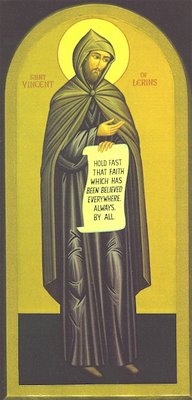
From Chapter 4 of the Commitorium, by Vincent of Lerins, 434:
"Now in the Catholic Church itself we take the greatest care to hold that which has been believed everywhere, always and by all. That is truly and properly 'Catholic,' as is shown by the very force and meaning of the word, which comprehends everything almost universally. We shall hold to this rule if we follow universality, antiquity, and consent."This is the famous rule of catholicity. It's a pretty nice idea, but even a cursory glance at church history makes the notion that something was believed "everywhere, always and by all" mere wishful thinking.
As it happened, Church Councils in the search for unanimity would decide what should be believed "everywhere, always and by all." But this is the ancient definition of catholicity. Heresy is defined over and against catholicity, beliefs that contradict the consensus of the faithful.
Questions:
So as a post-protestant who wants to care about catholicity, does Vincent's canon offer me any guidance?
I've learned to think about catholicity in terms of "living in dialogue" with the ancient faith; it's not as if the Church Fathers were a theologically homogenous group. I must say that the precariousness of my own catholicity makes me very reluctant to call people heretics. Is that as it should be?
What do you think about Vincent's canon? What does "catholicity" mean to you? Do you care about it? Is a claim to "catholicity" such as I have described sufficient?
Technorati Tags: theology, christianity, church history, anglicanism







3 comments:
I think that "catholicity" means that we are ONE PEOPLE. No matter what religion, political party, nationality, etc. ... in reality we are all parts of ONE BODY, and what affects one, affects all.
dang Kyle you are writing some good stuff and I ain't having time read it. Grrr.... Keep up the good work. I'll catchup latter. I shall never know how you manage to do this and keep up with your school work.
Well, S., that might have been a good sentiment for John Donne ("ask not for whom the bell tolls...") but I've never found such a definition of catholicity in any historical Christian writing. "Catholicity" might be a lot of things, but it is at least an explicitly Christian term.
Blessings on you.
Thanks, Ben. I usually just try to write on whatever's going on in my head. And happily, it's my job to have these things going around my head at this time in my life. :0)
Post a Comment